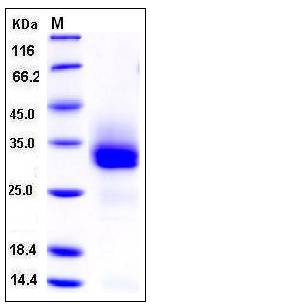Mouse FGF18 / FGF-18 Protein (His Tag)
D130055P09Rik,FGF-18
- 100ug (NPP1279) Please inquiry
| Catalog Number | P50177-M08H |
|---|---|
| Organism Species | Mouse |
| Host | Human Cells |
| Synonyms | D130055P09Rik,FGF-18 |
| Molecular Weight | The secreted recombinant mouse FGF18 comprises 191 amino acids and has a predicted molecular mass of 22.5 kDa. As a result of glycosylation, it migrates as an approximately 30-35 kDa band in SDS-PAGE under reducing conditions. |
| predicted N | Glu 28 |
| SDS-PAGE |  |
| Purity | > 95 % as determined by SDS-PAGE |
| Protein Construction | A DNA sequence encoding the mouse FGF18 (NP_032031.1) (Met 1-Gly 207) was fused with a polyhistidine tag at the C-terminus. |
| Bio-activity | 1. Measured by its binding ability in a functional ELISA. 2. Immobilized mouse FGF18 (P50177-M08H) at 10 μg/mL (100 μl/well) can bind Rat FGFR4 (P80093-R02H), The EC50 of Rat FGFR4 (P80093-R02H) is 0.44 μg/mL. |
| Research Area | Cancer |Oncoprotein & suppressor & biomarker |Oncoprotein |Growth Factor & Receptor |Fibroblast Growth Factor (FGF) & Receptor |Fibroblast Growth Factor (FGF) | |
| Formulation | Lyophilized from sterile PBS, pH 7.4 1. Normally 5 % - 8 % trehalose, mannitol and 0.01% Tween80 are added as protectants before lyophilization. Specific concentrations are included in the hardcopy of COA. |
| Background | Fibroblast growth factor 18 (FGF18) is a member of the fibroblast growth factor (FGF) family. FGF family members possess broad mitogenic and cell survival activities, and are involved in a variety of biological processes, including embryonic development, cell growth, morphogenesis, tissue repair, tumor growth, and invasion. It has been shown in vitro that FGF18 is able to induce neurite outgrowth in PC12 cells. Studies of the similar proteins in mouse and chick suggested that this protein is a pleiotropic growth factor that stimulates proliferation in a number of tissues, most notably the liver and small intestine. Experiment datas identified FGF18 as a selective ligand for FGFR3 in limb bud mesenchymal cells, which suppressed proliferation and promoted their differentiation and production of cartilage matrix. FGF18 appears to regulate cell proliferation and differentiation positively in osteogenesis and negatively in chondrogenesis. |
| Reference |
